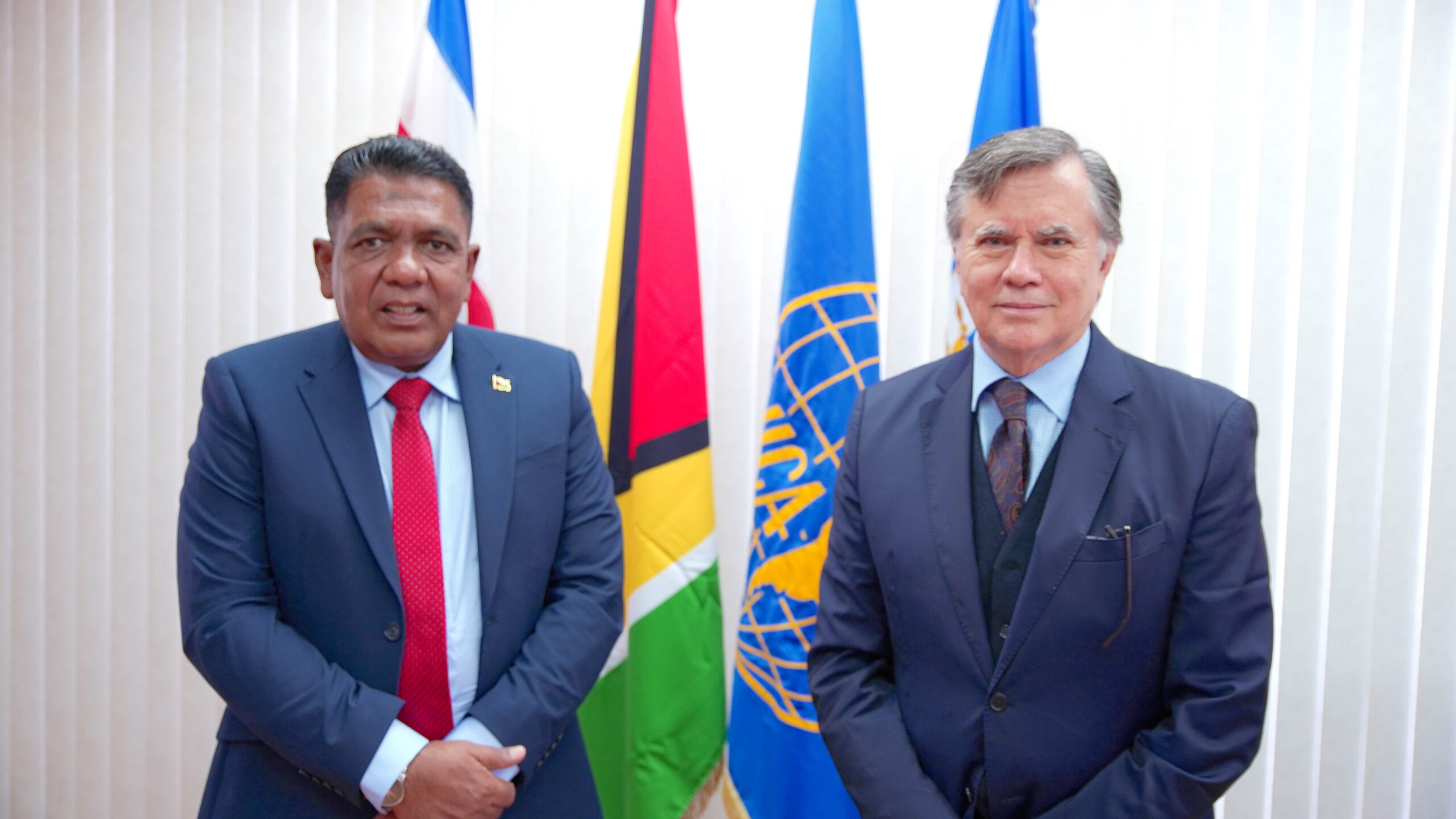Zulfikar Mustapha, Agriculture Minister of the Cooperative Republic of Guyana, affirmed his country’s support during an official visit to IICA headquarters, describing the proposal as innovative in bringing countries together, working as a team and collaborating with food security in the region.

San José, 17 June, 2022 (IICA). Zulfikar Mustapha, the Guyanese Ministry for Agriculture, guaranteed his country’s support for the continental alliance proposed by the Inter-American Institute for Cooperation on Agriculture (IICA) to address growing threats to food security in the hemisphere.
Mustapha made an official visit to IICA headquarters in San José, Costa Rica, where he met IICA Director General, Manuel Otero, to talk about the Caribbean nation’s action plans, priorities and agricultural challenges, and to dialogue on the main advances of Guyanese agriculture and discuss new opportunities for technical cooperation.
“We in Guyana will support the continental alliance and contribute to the Director General’s vision. We have to work together to achieve food security. The interest they have shown in food security not only in the Caribbean but in the whole world is to be applauded. IICA has been highly proactive in helping the agricultural sector to progress,” Mustapha said.
The Agriculture Minister described the alliance as an “innovative way of uniting the countries and working together to ensure that we address food security,” which has been aggravated by a current context of overlapping crises, including the Covid-19 pandemic, the conflict in Eastern Europe and climate change.
“In Guyana we are grateful, our president Dr. Mohamed Irfaan Ali is promoting these same ideas in the Caribbean Community (CARICOM) to form an alliance with countries from all over the world to address the issue,” the Minister added.
The alliance proposed by IICA for collective action to combat food insecurity, promote sustainability, guarantee peace and democratic stability, has as its roadmap a document with concrete proposals that was also submitted at the Summit of the Americas last week in Los Angeles, USA.
This medium- and long-term work is based on four strategic aspects: the strengthening and transformation of agrifood systems in the Americas, challenges and opportunities for agrifood trade in the region in the new geopolitical context, the role of science, technology and innovation, and facilitating economic and social inclusion by reinforcing the cooperative system.
“This alliance should promote a new generation of public policies that empower family farmers, who are essential, with new extension strategies, giving greater importance to questions of associativism and cooperativism. It also seeks to foster science and technology, and increase trade and integration. A new alliance is needed between production and the environment,” said Manuel Otero.
“It is necessary to act now to generate an effective coalition to promote food security in our continent, transforming threats into opportunities and generating a set of concrete actions. It is time to come together; no country can get through this crisis alone. Food security must be combated with concrete actions in the short and medium term,” Otero added.
Agriculture Priorities in Guyana
On his visit to IICA headquarters, Minister Mustapha, who is also chair of the Ministerial Work Group established by the CARICOM to analyze the food agenda and the agrifood system in the Caribbean, spoke about the reality of the agriculture sector in his country, a strategic nation with great capacity to become the food basket of the region.
He explained that Guyana’s priorities are to reduce food import costs 25% in three years, diversify production and increase resilience to climate change, focusing on corn, soy and wheat crops; boost intra-regional trade by removing barriers that impact the country; harmonize standards; and foster more science, innovation and technological development, boosting the institutional framework in these areas.
“We must look for ways to reduce the food import bill by 25% in the next three years; this is a monumental task, and we are going to need investments and a lot of capital, but we have the capacity. We want to diversify our economy, make it more resilient, so that small-sized farmers are part of this development that we seek,” said Mustapha.
“We have the land, the water and the capital, we can produce the corn and soy that we need for the Caribbean and for Guyana itself, which can become the center of food production, reduce its import costs and have a resilient productive sector,” he added.
During the meeting, Mustapha spoke about other issues the country is focusing on: work in logistics and food transport, infrastructure, agricultural extension, attracting young people to agriculture, and boosting the meat, poultry and aquiculture industries and rice and sugar chains.
Manuel Otero, IICA Director General, made a commitment to provide technical cooperation to Guyana for re-engineering and to strengthen the National Agricultural Research Extension Institute (NAREI), connect science with innovation and promote entrepreneurialism, train young rural people in the use of new technologies for agriculture and act as bridge in bilateral dialogues and in south-south cooperation actions.
“We wish to continue building an increasingly stronger technical cooperation agenda,” concluded Otero.
At IICA HQ, Mustapha was shown the initiatives included in IICA of Open Doors, such as the Interpretative Center for Tomorrow’s Agriculture (CIMAG), the Fab Lab agricultural technological innovation laboratory, and the Typical Rural House.
He was also informed in detail on IICA technical cooperation programs in Bioeconomy, Agricultural Health, International Trade, Climate Change and Territorial Development.
More information:
IICA Institutional Communication Division











